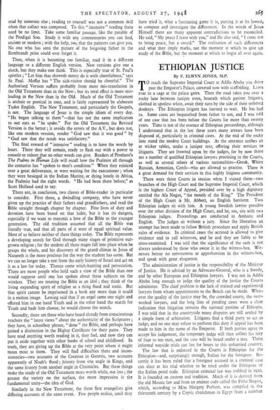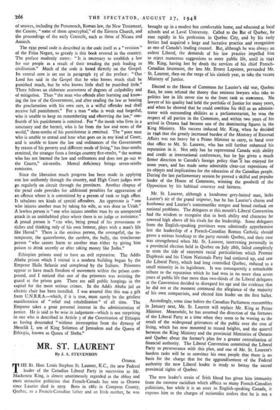ETHIOPIAN JUSTICE
By F. ELWYN JONES, M.P.
TO reach the Supreme Imperial Court at Addis Ababa you drive past the Emperor's Palace, corseted now with scaffolding. Lions roar in a cage at the palace gates. Then the road takes you over a rocky lane, between juniper trees, beneath which patient litigants, clothed in spotless white, await their turn by the side of their tethered donkeys. The Ethiopian litigant has learned to wait. He has had to. Some cases are bequeathed from father to son, and I was told of one case that has been before the Courts for more than twenty years. Time is not of the essence of Ethiopian proceedings, although I understand that in the last three years many arrears have been disposed of, particularly in criminal cases. At the end of the rocky lane stand the modest Court buildings. At the entrance scribes sit at wicker tables, under a juniper tree, offering their services to litigants. They are frowned upon by the judges, for by now there are a number of qualified Ethiopian lawyers practising in the Courts, as well as several others of various nationalities—Greek, White Russian, Armenian, Czech—who are allowed to practise. There is a great demand for their services in this highly litigious community.
There were three Courts in session when I visited them—two branches of the High Court and the Supreme Imperial Court, which is the highest Court of Appeal, presided over by a high dignitary entitled the Ma Negus, " the mouth of the King." The President of the High Court is Mr. Abbott, an English barrister. Two Ethiopian judges sit with him. A young Swedish lawyer presides over the other division of the High Court, and he, too, sits with two Ethiopian judges. Proceedings are conducted in Amharic and English. The judges sit without a jury. Since the liberation an attempt has been made to follow British procedure and apply British rules of evidence. In criminal cases the accused is allowed to give evidence and to call witnesses, and he and they are liable to be cross-examined. I was told that the significance of the oath is not always understood by those who swear it in the witness-box. Wit- nesses betray no nervousness or apprehension in the witness-box, and speak with great eloquence.
The administration of justice is the responsibility of the Minister of Justice. He is advised by an Advocate-General, who is a Swede, and by other European and Ethiopian lawyers. I was not in Addis Ababa long enough to judge the quality of the justice the Courts administer. The chief problem is the lack of trained and experienced lawyers from whom appointments to the Bench can be made. What- ever the quality of the justice may be, the crowded courts, the over- worked lawyers, and the long lists of pending cases were a clear indication that litigation remains the national pastime of Ethiopia. I was told that in the countryside many disputes are still settled by a simple form of arbitration. Litigants find a third party to act as judge, and no one may refuse to perform this duty if appeal has been made to him in the name of the Emperor. If both parties agree to accept his judgement, the temporary judge will then collect his jury of four to ten men, and the case will be heard under a tree. These informal wayside trials can last for hours in this unhurried country.
The law that is enforced in the Courts is Ethiopian for the Ethiopian—and, surprisingly enough, Italian for the foreigner. Re- cently it has been ruled that a foreigner accused in a criminal case can elect at his trial whether to be tried under the Ethiopian or the Italian penal code. Ethiopian criminal law was codified in 1930.
It is founded on custom and tradition. Much of it is derived from the old Mosaic law and from an ancient code called the Fitha Negast, which, according to Miss Margery Perham, was compiled in the thirteenth century by a Coptic churchman in Egypt from a number, of sources, including the Pentateuch, Roman law, the New Testament, the Canons, "some of them apocryphal," of the Eistern Church, and the proceedings of the early Councils, such as thOse of Nicaea and Antioch.
The 193o penal code is described in the code itself as a " revision " of the Fitha Negast, so greatly is this book revered in the country. The preface modestly states: " It is necessary to establish a law for our people as a result of their treading the path leading to civilisation." Much of the code is based directly on the Gospel. Its central core is set out in paragraph 15 of the preface: " Our Lord has said in the Gospel that he who knows much shall be punished much, but he who knows little shall be punished little." There follows an elaborate assessment of degrees of culpability and of mitigation. Thus " the man who offends after learning and know- ing the law of the Government, and after reading the law or hearing the proclamation with his own ears, is a wilful offender and shall receive full punishment." For a man " who is weak and forgetful, who is unable to keep on remembering and observing the law," one- fourth of his punishment is remitted. - For " the monk who lives in a sanctuary and the hermit, who is far from the law and news of the world," three-tenths of his punishment is remitted. The " poor man who is unable to attend and hear what goes on in any kind of Court, and is unable to know the law and ordinances of the Government by reason of his poverty and different mode of living," has four-tenths remitted, the stranger from a foreign country five-tenths, " the woman who has not learned the law and ordinances and does not go out to the Courts," sit-tenths. Mental deficiency brings seven-tenths remission.
Since the liberation much progress has 'been made in applying one law uniformly through the country, and High Court judges now go regularly on circuit through the provinces. Another chapter of the penal code provides for additional penalties for aggravation of an offence where it is committed by a person of rank or high office. It tabulates ten kinds of special offenders. An oppressor is " one who injures another man by taking his wife, as was done to Uriah." A lawless person is " one who injures another man by an unexpected attack in an uninhabited place where there is no judge or assistance." 4 proud person is " cne who, being proud of his possessions or riches and thinking only of his own honour, plays with a man's life like Herod." There is the envious person, the revengeful, the in- temperate, the quarrelsome, the careless, the bully, the treacherous person " who causes harm to another man either by giving him poison to drink secretly or after taking money like Judas."
Ethiopian prisons used to have an evil reputation. The Addis Ababa prison which I visited is a modem building begun by the Emperor Haile Selassie and completed by the Italians. Prisoners appear to have much freedom of movement within the prison com- pound, and I noticed that one of the prisoners was assisting the guard at the prison gate. There are still public hangings in the capital for the more serious crimes. In the Addis Ababa jail an electric chair has been installed. I was assured that this was a gift from U.N.R.R.A.—which, if it is true, must surely be the grisliest manifestation of " relief and rehabilitation " of all time. The Emperor takes a great personal interest in the administration of justice. He is said to be wise in judgement—which is not surprising in one who is described in Article 3 of the Constitution of Ethiopia as having descended "without interruption from the dynasty of Menelik I, son of King Solomon of Jerusalem and the Queen of Ethiopia, known as Queen of Sheba."



































 Previous page
Previous page